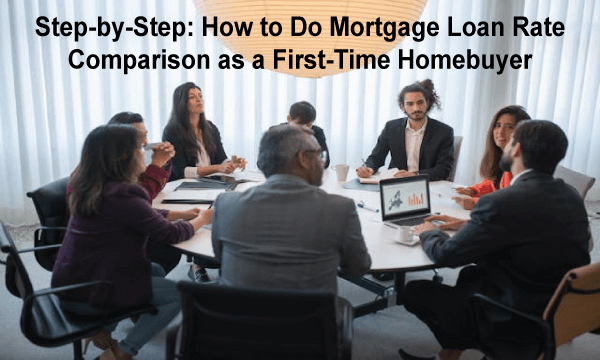Choosing the Best Mortgage Lender in a High-Interest Housing Market

With rates higher than they’ve been in years, picking the best mortgage lender isn’t just a smart move; it could literally save you thousands over the life of your loan.
Choosing a mortgage can be a challenging financial decision in today’s high interest rate market.
So how do you know which lender is actually the best? Is it the one with the lowest rate? The lender who offers the fastest approval? Is it the lender offering the friendliest support? The truth is, there’s a lot more to it than just numbers on a page.
In this guide, I’ll walk you through what really matters when choosing a lender in this kind of market so you can avoid common pitfalls and confidently pick a mortgage partner that works for you and not just your loan file.
What Makes a Mortgage Lender “The Best”?
So, what actually separates a good mortgage lender from the best mortgage lender, especially when interest rates are high?
It’s not just about flashing the lowest rate in an ad, where the rate doesn’t always apply to you. The best lenders go beyond the headline numbers. They’re transparent and responsive, and they help you understand exactly what you’re signing up for.
Here’s what to look for:
Honest, Straightforward Communication
A great lender will break things down in plain English. No jargon. No pressure. Just clear up info and answers to your questions before you even apply.
Competitive Rates and Fair Fees
Low rates are excellent, but not if they’re hiding ridiculous closing costs. The best mortgage lenders give you the full picture: interest rate, APR, points, and all those sneaky fees in between.
Speed and Support You Can Rely On
In a hot market, timing is everything. Top lenders keep things moving fast without sacrificing accuracy. You don’t want delays costing you your dream home.
Stellar Reviews and Referrals
Look for lenders who have glowing feedback from other homebuyers, especially folks in your situation. Online reviews, Reddit threads, and real estate agents can all point you in the right direction.
At the end of the day, the best mortgage lender isn’t just the cheapest; it’s the one who’s got your back from start to finish.
How High Interest Rates Impact Your Mortgage Options
Let’s address the significant issue of high interest rates. High interest rates have significantly complicated the process of buying a home. But here’s the thing: while you can’t control the market, you can control how you respond to it. And choosing the best mortgage lender plays a giant role in that.
So how exactly do high rates affect your mortgage choices?
Monthly Payments Go Up Fast
Even a 1% increase in rates can add hundreds to your monthly payment. That’s why it’s crucial to collaborate with a lender who can assist you in conducting financial calculations and determining a loan structure that aligns with your budget.
Rate Locks Matter More Than Ever
Obviously, rates can change from one day to the next. The best lenders will offer a rate lock, sometimes for 30, 45, or even 60 days, so you’re not stuck with a higher rate just because you hit a delay.
Loan Strategy Becomes Crucial
The right lender will walk you through your options and tailor the loan to your situation, not just sell you the default choice.
Speed Can Make or Break the Deal
When rates are climbing, every day counts. You’ll want a lender who’s fast with paperwork, quick on approvals, and won’t leave you hanging when things get competitive.
High interest rates don’t mean homeownership is off the table; you just need a smart plan and the best mortgage lender to guide you through it.
Compare the Types of Mortgage Lenders: Who Offers the Best Value?
Unbeknownst to many, not all mortgage lenders are equal. Depending on the individual you collaborate with, your loan experience could either be effortless or extremely challenging. To find the best mortgage lender for your needs, you’ve got to know your options.
Let’s break down the main players:
Local Banks & Credit Unions
These guys tend to have a more personal touch. You might even know your loan officer by name. Some offer better rates for members or local programs for first-time buyers. One of the downsides is that they may be slower and have stricter lending criteria.
Big National Banks
You know the names—Chase, Wells Fargo, and Bank of America. They offer stability, a wide range However, the quality of service can vary, and you may often feel like a mere number within a vast system.
Online Mortgage Lenders
These companies move fast, often offer lower rates, and have sleek online platforms. But if you’re someone who likes face-to-face support, this route might feel a little impersonal.
Mortgage Brokers
They don’t lend money themselves; instead, they shop around for you. A trustworthy broker can find you competitive deals, especially if your credit or income situation is unique. Just watch for broker fees and always double-check the rates they present.
So… Who’s the best?
It depends on you. Are you tech-savvy and want speed? Go online. Prefer local advice and face-to-face help? A credit union might be best. Need many options? A broker could prove to be an invaluable resource.
Remember: the best mortgage lender isn’t just the one with the lowest rate; it’s the one who understands your goals, explains your options, and helps you close the deal with confidence.
Key Questions to Ask Before Choosing a Mortgage Lender
Picking the best mortgage lender isn’t something you want to rush. You’ve got to ask the right questions to figure out if they’re truly the right fit.
Here are some key questions to bring to the table:
- “What’s the APR, and how does it differ from the interest rate?”
Many lenders flash low rates, but the APR includes the real cost of the loan: fees, points, everything. If the lenders cannot explain the difference clearly, you should ask for clarification.
- “What fees should I expect at closing?”
Ask about origination fees, underwriting, appraisal, and title insurance. Anything that adds to your bottom line. The best mortgage lenders will lay it all out without any hidden surprises.
- “Do you offer a rate lock, and for how long?”
With rates fluctuating, locking in a good one is a must. Make sure you know the terms—and if it’ll cost you anything.
- “How long does the approval process usually take?”
Timing matters, especially in a competitive market. You want a lender who can move quickly without cutting corners.
- “How do you communicate throughout the process?”
Text? Email? Phone? Portal? Pick a lender whose style matches yours. No one wants to be ghosted halfway through their home loan.
- “Can I get a loan estimate today?”
This is an excellent method for comparing different mortgage lenders. If they hesitate or dance around the question, they’re probably not the best mortgage lender for you.
Pro tip: Don’t be afraid to interview multiple lenders. The more questions you ask, the clearer it’ll be who’s just selling and who’s actually helping.
The Power of Pre-Approval: Why It Sets the Best Mortgage Lenders Apart
If you’re committed to purchasing a home, particularly in a market with high interest rates, obtaining a pre-approval is crucial. It demonstrates your legitimacy to potential sellers and provides a clear understanding of your affordability.
However, it’s important to note that not all pre-approvals are equal. The most skilled mortgage lenders understand the importance of their pre-approvals.
What is pre-approval?
It’s more than just a quick credit check. A legit pre-approval means the lender has reviewed your finances. This means that the lender is essentially saying they’d lend to you
It’s stronger than pre-qualification, which is more of a ballpark guess. And in a competitive market, pre-approval can be the difference between getting the house or getting ghosted.
What should a solid pre-approval include?
- Your estimated loan amount
- Your interest rate and loan type
- How long the pre-approval is good for (usually 60–90 days)
- A letter you can submit with your offer
The best mortgage lenders will also explain what might affect your approval, like changing jobs, opening new credit cards, or making big purchases before closing.
Why does it matter so much in a high-interest market?
When rates are rising, speed is key. A strong pre-approval lets you jump on a home fast, before someone else snags it or your rate shifts. Plus, it gives you negotiating power with sellers who want a sure deal.
Quick tip: Get pre-approved before you start house hunting seriously. That way, you won’t fall in love with a home you can’t finance.
Credit Score & Down Payment: How the Best Mortgage Lenders Customize Options
If you believe that your credit score is not considered “perfect” or that your down payment seems somewhat small,small, You’ve got more options than you think, and the best mortgage lenders know how to tailor the loan to fit you, not the other way around.
What if my credit score isn’t outstanding?
Maybe you missed a payment or two, or your credit just hasn’t had time to grow. While some lenders may reject your application, the best ones will accommodate your situation.
They’ll explain:
- What loan types you qualify for (like FHA or VA loans)
- Whether paying down a little debt can bump your score
- If it makes sense to wait, fix your credit, and then apply
How much do I really need for a down payment?
You may have heard that a 20% down payment is the ideal amount, but this is outdated thinking. The truth is;
- FHA loans let you go as low as 3.5%
- Conventional loans sometimes offer 3% down for first-time buyers
- VA and USDA loans? Zero down if you qualify
The best mortgage lender won’t pressure you into putting down more than you’re comfortable with. Instead, they’ll show you how your down payment affects things like mortgage insurance, monthly payments, and long-term interest costs.
It’s not one-size-fits-all
Maybe you’ve got a solid income but low savings. Or you’ve got savings, but your credit needs work. A good lender listens first, then recommends the best-fit loan program, not just the one that’s easiest for them to process.
Ultimately, the best mortgage lenders don’t pass judgement; instead, they provide education and advice and make necessary adjustments. No matter where you’re starting, they’ll help you find the smartest path to homeownership.
Hidden Fees & Fine Print: What to Watch Out For
Mortgage paperwork is not light reading. There are numerous fees to consider. Some are standard; some are sketchy. Knowing the difference can save you a serious chunk of change.
The best mortgage lenders won’t just hand you a stack of papers and hope you don’t ask questions; they’ll walk you through every line so you know exactly what you’re paying for.
Common fees you should expect:
- Origination fee – What the lender charges to process your loan (typically 0.5%–1% of the loan amount)
- Underwriting fee – For reviewing your loan application
- Appraisal fee – To assess the value of the home
Credit report fee – Small, but often included - Title and escrow fees – For closing and legal stuff
These aren’t bad fees, but you should know about them up front.
Fees that might raise a red flag:
- “Junk fees” with vague names or no explanation
- Surprise charges that weren’t in your Loan Estimate
- Fees that seem way above industry averages
- Prepayment penalties (always ask if these apply!)
Understand Your Loan Estimate (LE)
The Loan Estimate (LE) is an invaluable tool. It lays out all the costs, interest rate, APR, monthly payment, and total cash needed at closing. If a lender won’t provide you with a clear estimate early on, you should walk away.
The best mortgage lenders will encourage you to compare their LE with others. Why? This is because they are confident in their offerings and have nothing to conceal.
Pro tip: Don’t just look at the interest rate. Look at the APR, it’s the true cost of borrowing, fees and all.
Best Online Tools & Apps to Compare Mortgage Lenders Today
Nobody wants to spend hours cold-calling banks or digging through outdated websites. The good news is that there are awesome tools out there that make comparing lenders quick, easy, and (almost) fun.
These sites and apps can simplify the process of finding the best mortgage lender for your situation.
Top tools to check out:
- LendingTree – Compare multiple lenders at once based on your credit and location
- Bankrate – Great for seeing national average rates and estimated monthly payments
- Zillow Mortgage Marketplace – Real-time rate comparisons from multiple lenders
- NerdWallet – Super user-friendly, with filters for credit score, down payment, and loan type
- Credit Karma – Not just for credit scores, they offer lender matches too
Some sites show advertised rates, not custom rates based on your full financial picture. That’s why it’s smart to:
- Use these tools for ballpark comparisons
- Still reach out to a few lenders directly for actual loan estimates.
- Look beyond the rate; check fees, loan terms, and customer service reviews
Bonus tip: Use a simple spreadsheet to compare
Grab a free template or make your own. Track:
- Interest rate
- APR
- Closing costs
- Monthly payment
- Lender responsiveness
You’ll quickly spot who’s offering value and who’s just throwing out teaser rates with tons of strings attached.
The best mortgage lenders won’t shy away from comparisons. They know a smart shopper becomes a delighted homeowner.
Red Flags: How to Spot a Bad Lender in Any Market
Not every lender is out to help you. Unfortunately, this is not always the case. Some are more interested in closing the deal than actually getting you into the right loan. And when interest rates are high, the pressure to “just go with someone” can lead to costly mistakes.
That’s why spotting a bad lender early on is just as important as finding the best mortgage lender.
Here’s what to watch for:
Too-good-to-be-true rates
If a lender offers a rate significantly lower than others, it’s likely not indicative of the entire situation. Maybe they haven’t included fees, or maybe you won’t actually qualify for that rate. Always ask for the APR and a full loan estimate.
Vague or rushed answers
If a lender can’t (or won’t) clearly explain your loan options, fees, or timelines, that’s a major red flag. The best mortgage lenders take the time to educate you, not confuse you.
Missing or inconsistent paperwork
There are some signs to look out for. These signs point to poor internal systems, and they can delay your closing or even kill your deal. These include lost documents. Repeated requests. Conflicting numbers, etc.
High-pressure sales tactics
No lender should ever rush you into a decision, tell you to skip the fine print, or say things like “You have to lock this rate right now!” That’s not guidance. That’s a pushy sales pitch.
Bad reviews or no online presence
Always do a quick online search. Google reviews, Reddit threads, or BBB complaints can expose shady practices. If a lender has nothing out there at all? That’s just as sketchy.
Ultimately, you should rely on your intuition. If something feels off, it probably is. The best mortgage lender will make you feel informed, empowered, and confident, not confused or pressured.
Checklist To Choose the Best Mortgage Lender with Confidence
You’ve done the homework, asked the questions, and maybe even collected a few loan estimates. So now comes the big question: how do you actually choose the best mortgage lender for you?
Here is a straightforward checklist to assist you in sorting through the confusion and arriving at a well-informed, stress-free decision:
Your Mortgage Lender Checklist
- Did they offer a clear, easy-to-understand loan estimate (LE)?
- Are the interest rate and APR competitive?
- Are fees and closing costs reasonable and fully explained?
- Did they answer your questions promptly and honestly?
- Do they offer a rate lock that fits your timeline?
- Do they have solid reviews or recommendations?
- Did they explain your loan options (FHA, conventional, etc.) clearly?
- Is the pre-approval letter strong and specific?
Did you feel heard, not pressured?
If you can check most or all of these boxes, you’re probably staring at your best option.
Don’t forget, the best mortgage lender isn’t just about numbers on a sheet. It’s about trust, clarity, and getting you to the closing table without the chaos. You will notice a difference from the moment you find a lender who treats you as a partner, not just a transaction.
Pro tip: Still torn between two lenders? Go back and ask both for their final and best offer. You’d be surprised how often they’ll sweeten the deal to earn your business.
Conclusion
Choosing the best mortgage lender in a high-interest housing market might feel overwhelming, but it doesn’t have to be. When you slow down, ask the right questions, and compare your options side by side, the right choice becomes pretty clear.
Don’t just chase the lowest rate. Seek a lender who excels in communication and checking other details and truly supports you. This type of service is invaluable, particularly when every dollar matters.
FAQ
1. How do I choose the best mortgage lender?
Start by comparing rates, fees, and reviews. Ask questions about pre-approval, rate locks, and closing costs. A great lender will offer clear answers and personalized support.
2. What questions should I ask a mortgage lender?
Ask about APR vs. interest rate, rate lock options, fees, approval timeline, and how they communicate. These answers reveal how helpful and honest they’ll be.
3. Does my credit score affect which mortgage lender I should choose?
Yes. Some lenders work better with lower credit scores and offer flexible loan options. Others may have stricter requirements. Always ask what options are best for your score.
4. Is it better to go with a bank or a mortgage broker?
Banks offer direct loans, while brokers shop around on your behalf. Brokers can help you find competitive rates but may charge extra fees. It depends on your needs and comfort level.
5. Can I negotiate mortgage rates with lenders?
Absolutely. You can and should negotiate rates and fees. Bring competing offers to the table—many lenders are willing to match or beat them to earn your business.
6. How many mortgage lenders should I get quotes from?
Aim for 2–3 quotes at minimum. Comparing loan estimates helps you spot hidden fees and find the best overall deal—not just the lowest advertised rate.
























